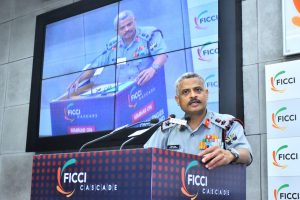20th June 2024,Thursday | Commission Room, FICCI, Federation House, New Delhi
Smuggling and illicit trade are complex global threats undermining society, harming legitimate economies, and reducing government revenues. Apart from this, these operations now use advanced technologies and global supply chains to evade detection, funding criminal enterprises and terrorist organizations, and compromising national security. In response, FICCI CASCADE organized a seminar on June 20, 2024, titled “Global Challenges of Illicit Trade and the Way Forward,” to address these issues and foster collaboration against this universal threat. With extensive participation from government bodies, industry leaders, law enforcement agencies, and civil society, the seminar facilitated a comprehensive discussion. While various perspectives were shared, the primary focus remained on formulating effective strategies to combat this growing menace.
“Combating such expansive networks demands a coalition of government bodies and non-state actors,” remarked Mr. Mohan Kumar Singh, Principal Director General of the Directorate of Revenue Intelligence (DRI). He vividly illustrated the profound threat of illicit trade and highlighted how smuggling and counterfeiting erode legitimate economic activities, deplete government revenues, and fuel organized crime. With striking statistics, Mr. Singh revealed that in the 2023-24 financial year alone, the DRI uncovered 623 cases, averaging nearly two per day, resulting in the seizure of contraband worth Rs. 3500 crores. These included narcotics, gold, fake currency and a variety of other illicit goods like cigarettes and wildlife products. Mr. Singh advocated for global cooperation to tackle this menace, highlighting the success of international cooperation efforts giving the example of WCO-led Operation TIN CAN in seizing contraband within legitimate cargo. He praised FICCI CASCADE’s relentless campaign against illicit trade and the seminar for fostering essential dialogue and collaboration. He emphasized the urgent need to involve relevant stakeholders, noting that many DRI investigations reveal troubling infiltration of supply chains and insider involvement.
“It takes a network to defeat a network,” Mr. P K Das, Director of the Compliance and Facilitation Directorate at the World Customs Organisation (WCO), highlighted the WCO’s efforts against illicit trade, including the Illicit Trade Report. He praised Indian Customs’ support, especially through Operation Shesha, a collaboration with Hong Kong Customs and the WCO. Mr. Das highlighted the importance of a networked approach to dismantle illicit networks, calling for coordinated efforts in analysis, interdiction, investigation, prosecution, and penalties. He concluded by promoting trade integrity and commending FICCI for its support to Indian Customs in this fight.
Mr. Anil Rajput, Chairman of FICCI CASCADE, delivering the welcome address at the seminar, said, “In India, DRI and other enforcement agencies have been playing a significant role in combating illicit trade through increased seizures of illicit products like gold, cigarettes, currency, and cosmetics at airports, seaports, and border points. Today, illicit trade operatives exploit AI to automate smuggling processes and analyze border control data, law enforcement activities, and surveillance patterns. This misuse of technology requires our unabated focus.” “I must emphasize that despite the increase in seizures, these represent only the tip of the iceberg. The problem’s magnitude is significantly higher and continues to grow exponentially. Hence, it is imperative to enhance global cooperation in combating illicit trade. One proposed solution is establishing a ‘Global Forum’ of enforcement agencies worldwide, supported by a dedicated secretariat. FICCI CASCADE stands ready to collaborate with the government and enforcement agencies to develop a comprehensive strategy,” Mr. Rajput added.
“Illicit trade lurks in the underbelly of the economy” Mr. P C Jha, Advisor to FICCI CASCADE and former CBIC Chairman, stressed the need for technology, and international cooperation to combat illicit trade. He noted significant economic impacts and highlighted FICCI CASCADE’s role in promoting responsible behaviour among consumers and youth.
“There are no immediate shortcuts that we can apply but we have to think of the long run and within that structure the short run,” said, Prof. Arun Kumar, Author & Retd. Professor of Economics at Jawaharlal Nehru University. He highlighted the extensive reach of illicit trade, linking it to the black economy and black income generation. He stressed the critical role of the international financial system in addressing this issue and identified a corrupt nexus—comprising businessmen, politicians, and executives—as key to perpetuating illicit trade. Prof. Kumar mentioned that combating this, requires political will and accountability at all governance levels. He referenced India’s 1950s development, which focused on resource management to alleviate poverty and illiteracy. Prof. Kumar advocated dismantling the corrupt nexus and called for honesty in implementing technological measures like digitization and cryptocurrency. He also highlighted the importance of social and cultural factors in international collaboration and urged independent regulatory agencies to drive positive privatization.
“Recognizing that a border is more than just a line is crucial in addressing these complex issues of illicit trade and smuggling effectively.” Brigadier Girish Upadhya SM, VSM, DIG- 23rd Sector Assam Rifles briefed on the role of Assam Rifles in ensuring national security and preventing smuggling and illicit trade. He highlighted the challenging terrain of the northeast, noting the difficulties of guarding inaccessible borders with limited resources. Brigadier Girish explained the existence of both legal and numerous illegal crossing points and emphasized the collaboration with stakeholders like Customs and DRI at various checkpoints. Brigadier Girish also discussed the implementation of measures such as biometric checks and regular monitoring to mitigate risks, enhance compliance, and support national security efforts.
Mr. Najib Shah, Former Chairman of the Central Board of Indirect Taxes and Customs and a FICCI CASCADE Think Tank Member, highlighted the increased quantum of seizures, stressing that the visible figures of seizures by Customs are only a fraction of the actual illicit inflow. Mr. Shah raised a crucial point about right holders’ reluctance to engage in the process, possibly due to concerns over credibility or lengthy destruction procedures. He urged the CASCADE committee to address this issue, stressing the necessity for right holders to be actively involved in safeguarding their counterfeited products from being smuggled.
Indian Customs is implementing evolving strategies to combat illicit trade, mentioned Mr. Sanjay Bansal, Commissioner (Import & Exports). He emphasized the use of data analytics to enhance intelligence, enabling the targeted capture of high-risk consignments. Praising platforms like the Economic Intelligence Council, he noted their role in fostering inter-agency collaboration to strengthen investigations. Mr. Bansal spoke about the importance of a multi-agency approach and international partnerships to disrupt illicit financial flows. He detailed the repetitive nature of strategies used by customs, driven by continuous feedback and intelligence sharing, ensuring adaptive responses to evolving threats. His insights depicted proactive measures at India’s borders, safeguarding national security and economic stability amid a complex global trade landscape.
Mr. B. Shanker Jaiswal, IPS, Joint Commissioner of Police (Tech, Cyber & Licensing), Delhi Police highlighted the need of urgency and innovation in combating illicit trade through advanced technology and the need for skilled personnel capable at navigating the dark web and digital transactions. Mr. Jaiswal encouraged for using government databases and employing AI for proactive data mining, enabling law enforcement to anticipate and disrupt illicit activities effectively. His vision of data-driven monitoring reflects future-oriented approach, where AI simplifies precise irregularity detection and targeted investigations. His insights portrayed a forward-thinking strategy, leveraging technology to bridge the gap between current capabilities and the goal of eliminating illicit trade, ensuring robust enforcement in an increasingly digital landscape.
“Educating the public about the dangers associated with smuggling and its consequences is crucial.” Mr. Robin Gupta, Joint Director of the Enforcement Directorate, emphasized the importance of public education in combating smuggling. He noted that increased awareness deters smuggling, especially when combined with severe punishments. Mr. Gupta stressed the need for community engagement and stakeholder involvement, promoting the reporting of suspicious activities and cooperation with law enforcement. He also highlighted the crucial role of artificial intelligence and analytics in predicting and identifying smuggling activities, underscoring their importance in the strategy against illicit trade.
Ms. Sungita Sharma, Former Special Secretary of the Central Board of Indirect Taxes and Customs, while concluding the seminar, emphasized the urgent need for unified action against illicit trade, highlighting the importance of a networked strategy to disrupt these networks and promote ethical conduct. The discussions stressed the necessity for decisive political leadership, transparent accountability, innovative technological solutions, and collaborative frameworks to enhance border security. These insights offer a roadmap for future efforts, reinforcing our commitment to upholding global commerce integrity and collective prosperity.
The seminar on global illicit trade and the way forward was attended by over 200 industry stakeholders. Insights gleaned from the discussions, underscores the vital role of a networked approach, transparent accountability mechanisms, Global Forum, Resource Management, Consumer Awareness and innovative technological solutions in combating illicit trade. As we navigate the complexities of this challenge, the shared commitment of diverse stakeholders will be pivotal in safeguarding the integrity of global commerce and fostering sustainable prosperity.
Media Coverage -Seminar 20 June 2024Download Pdf














